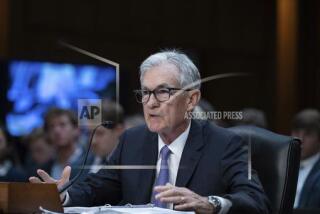Fed may act if job market doesn’t improve, Bernanke says
The Federal Reserve may try to push borrowing costs even lower if the job market continues to languish, Fed Chairman Ben S. Bernanke said Thursday, offering a hint of what might trigger additional monetary easing.
After three quarters of solid growth, the U.S. economy has been losing steam, with firms still reluctant to hire and the housing sector seemingly unable to exit a prolonged rut.
Bernanke’s comments accompanied Labor Department data Thursday showing that new claims for state unemployment benefits jumped to 464,000 last week..
With fears of a “double-dip” recession mounting in recent weeks, Bernanke reassured lawmakers that the Fed was prepared to take further steps if the situation worsened appreciably.
“We are ready and will act if the economy does not continue to improve, if we don’t see the kind of improvements in the labor market that we are hoping for and expecting,” Bernanke told the House Financial Services Committee.
As he did before a Senate panel Wednesday, Bernanke indicated that the Fed does not expect the economy to stall and therefore does not foresee a need for any extra policy measures.
Another top Fed official, New York Fed President William Dudley, said Thursday that the U.S. economic recovery was “a bit bumpy,” with growth that was “far less robust” than the U.S. central bank wanted. However, he added that a renewed recession was not likely.
Even with interest rates essentially at zero, Bernanke said there was more the central bank could do if needed to spur growth.
One possibility would be to lower the rate it pays banks to park excess reserves at the Fed, currently 0.25%. Asked by a lawmaker why the Fed continues to pay banks to keep their money idle despite weak lending conditions, Bernanke said cutting the rate carries risks.
“If rates go to zero there will be no incentive for buying and selling federal funds — overnight money in the banking system — and if that market shuts down … it’ll be more difficult to manage short-term interest rates,” Bernanke said.
Other options for the Fed include bolstering its stated commitment to keep official rates low for an “extended period,” or purchase yet more debt, Bernanke said.
In addition to slashing interest rates to rock-bottom levels, the Fed bought more than $1.5 trillion in mortgage and Treasury securities in an effort to combat the deepest recession since the Great Depression.
More to Read
Inside the business of entertainment
The Wide Shot brings you news, analysis and insights on everything from streaming wars to production — and what it all means for the future.
You may occasionally receive promotional content from the Los Angeles Times.










